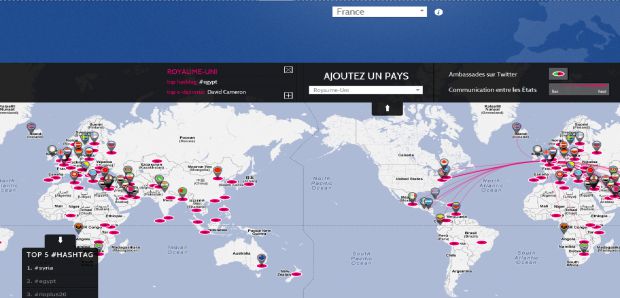"En pocos meses o años, todos empezaremos a dejar de hacer distinciones entre diplomacia y diplomacia digital; toda diplomacia digital se convertirá en diplomacia, sin adjetivos."
"El embajador Arturo Sarukhan, es un diplomático de carrera de México, actualmente ejerce como Presidente de Global Solutions/A Podesta Company, consultora con base en Washington D.C. En su vasta trayectoria diplomática, entre otros, se desempeñó como embajador de México en Estados Unidos (2007-2013) y Consul General en Nueva York.
Hace unos meses el embajador Sarukhan publicó en The Huffington Post el artículo “Diplomacy and the Digital Age“. En este conexto, lo entrevistamos en Apuntes Internacionales para conocer su visión sobre el uso de las redes sociales en diplomacia y las posibilidades que esta herramienta proporciona a las cancillerías en sus estrategias de política exterior.
¿En qué aspectos la tecnología y las redes sociales han impactado en los gobiernos y específicamente en la función diplomática?
Han cambiado radicalmente la manera de conducir la diplomacia pública –y la diplomacia en su conjunto- y proveen a aquellas cancillerías y gobiernos que las adopten con inteligencia y de manera proactiva como una herramienta singular para expandir su huella de poder suave en el extranjero. Son una gran fuente de inteligencia abierta que tener un pulso fino de lo que ocurre en otras naciones. Es un canal de comunicación directo con la opinión pública, sin tener que pasar por el filtro o el tamiz de los medios tradicionales. Y ofrece un mecanismo para generar redes de coaccionismo con la sociedad civil, generando apoyo a políticas públicas y a posiciones diplomáticas, y rompiendo las barreras tradicionales entre ciudadanos y el quehacer cotidiano de la diplomacia. Así como en su momento el orden internacional se definió por la confrontación entre marxismo y capitalismo, o el mundo occidental vs el bloque socialista, o democracia vs dictadura, hoy la bipolaridad se da entre sociedades abiertas y sociedades cerradas. En toda sociedad abierta el papel de las redes sociales se ha convertido en un factor determinante de la organización e interacción sociales, y del orden público y político. La diplomacia de toda sociedad abierta debe asumir, entender y trabajar por ende con los medios sociales.
¿Cuál es la oportunidad para los países en desarrollo de conectar su estrategia de diplomacia pública con su marca país? y ¿qué rol juegan en ese sentido las redes sociales?
Hay una relación íntima entre diplomacia pública, marca país y el impacto y penetración de las redes sociales, sobre todo en las áreas de promoción cultural, gastronómica y turística.
¿Cómo cree se puede sortear la barrera de la estructura estatal y de las arraigadas tradiciones para innovar y adaptarse a las demandas que impone la globalización?
Con la excepción de los bebes, a todas las demás personas les molesta profundamente el cambio. Las cancillerías y los servicios diplomáticos del mundo no son la excepción. De entrada, el siglo 21 es un muy mal siglo para el micromanejo diplomático, para el control vertical y jerárquico y para quienes no les gusta asumir riesgos. La diplomacia digital requiere, para ser exitosa, un alto grado de descentralización y asumir desde las capitales de que las Embajadas y sus embajadores deben tomar riesgos en las estrategias de comunicación vía redes sociales, y que ello hará inevitablemente que se den errores. Pero hay que asumirlos, no queda de otra. Diplomático, embajador o embajada que tenga que pedir consultas a capital para subir un tuit o responder de manera oportuna y en tiempo real vía redes sociales del país en el que está acreditado no podrá aprovechar esos medios a cabalidad. Las redes sociales no esperan instrucciones diplomáticas vía valija, cable o teléfono de la capital.
¿Cuáles son los principales elementos que a corto plazo debiese tener toda Cancillería moderna, para posicionar a su personal diplomático como agentes efectivos de intermediación y de promoción de los intereses nacionales?
Lo primero, y prioritario, es capacitar, capacitar y capacitar. Hay que entrenar a los nuevos cuadros en el uso inteligente y proactivo de estas herramientas, y buscar que los diplomáticos más tradicionales o reacios a entrar al siglo 21 descarten la reticencia a usarlas. Segundo, cerciorarse que todo diplomático entiende que éstas son herramientas para establecer un dialogo, para escuchar, para interpretar, para reaccionar, para corregir. Por ende, su uso debe estar estrictamente vinculado con el desahogo del cargo diplomático y de los intereses nacionales.
¿Cree son conciliables las herramientas tradicionales con las nuevas en el mundo de la diplomacia?
Absolutamente. Las herramientas son eso, herramientas, ni más ni menos. Complementan, no sustituyen a la diplomacia. Hay que aprender a usarlas para ser eficaces en su uso. Pero al final del día, ninguna herramienta, por buena o moderna que sea, sustituirá el contenido y el planeamiento diplomático. Las redes sociales no sirven si no están sustentadas en políticas y en visiones diplomáticas inteligentes y acordes con el país para el cual fueron diseñadas y en el cual se aplican. Al final del día, dejaremos de diferenciar entre diplomacia digital y diplomacia tradicional. En pocos meses o años, todos empezaremos a dejar de hacer distinciones entre diplomacia y diplomacia digital; toda diplomacia digital se convertirá en diplomacia, sin adjetivos.
Entrevista de Osvaldo Ojeda
